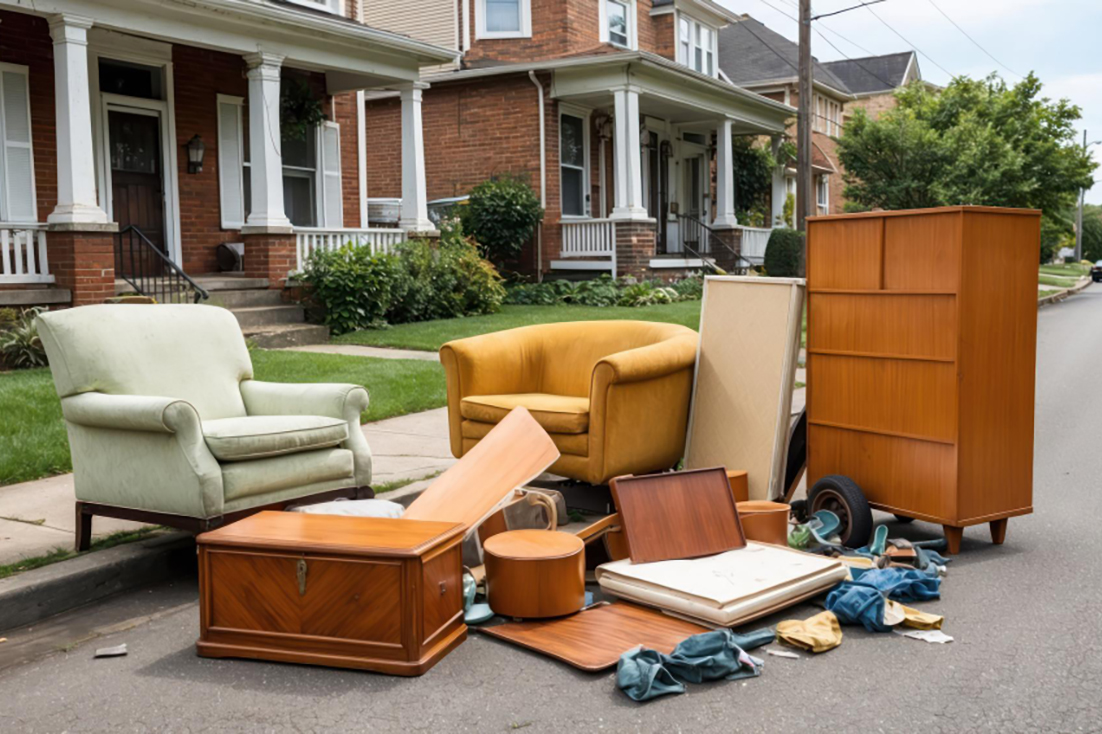What to know about squatting – how it affects heirs and claimants:
- Removing squatters through a legal eviction requires an eviction notice and court order.
- You can sell an occupied property “as-is” to investors like Heir Solutions, even with squatters in place.
- Trespassing and squatting are totally different and require unique legal action to fix.
- Ohio squatter rights can allow squatters who occupy a property for 21 years and pay property taxes to claim ownership.
What is squatting, and what happens now?
Heirs or property owners who inherit deceased estates will usually need professional help to deal with squatting. These heirs, like you, have legal rights (and so do the squatters if they’ve been living in the home for an extended period of time). As you try and reclaim your inherited home, you’ll likely need to serve an eviction notice and deal with claims like adverse possession for which Ohio homeowners usually have to follow a strict and defined legal process through the court system.
As you’d expect, there are various legal requirements and specific laws governing squatter eviction in Ohio (like anywhere), and it’s worth noting that while you can’t sell the home in the usual ways, you do have the option of selling the property as-is to someone like Heir Solutions who can buy your house with cash. You will need to find somebody who can look after your interests, and help you move on from this nightmare efficiently – but a wise guide will save you the heartache of learning how to remove squatters from your property alone.

What Are Squatter’s Rights in Ohio?
Navigating squatter rights in Ohio can be a lonely road. The adverse possession laws can allow intruders to claim ownership of a property from the legal heir under specific circumstances if, for example, they keep visible and ongoing control over a home or it’s land for 21 consecutive years and pay the related property taxes.
This law is meant to stop landlords and heirs from leaving abandoned property in town for any amount of time. Practically, this means that if you inherit, or have a legal claim to a property, you’re on the clock and you need to act quickly and learn how to remove squatters from your property, while staying within your rights to keep your legal title and stop any claims.
When squatters know they can gain ownership after 21 years, you’ll potentially have an adverse possession claim which can result in losing your legal ownership of the land and it’s value. If they then refuse to leave after your written warnings, you’ll need to file a court order (which usually means starting an eviction lawsuit with an attorney). This is one way that allows you to protect your property rights from any potential legal claim.
How Squatter’s Rights Affect Heirs and Owners
Like you, all heirs benefit from knowing Ohio’s squatter laws, to understand the legal landscape if squatters stay in an otherwise unoccupied property illegally. The intruders might be able to claim a right to the home through adverse possession laws which threaten the original owner’s (and the heirs) rights to the property. If no action is taken, squatters can make it hard to prove legal ownership, creating long-term problems for getting the real estate back.
Squatting mainly affects inherited homes and rentals that are empty or ignored. You’re in danger of losing your real estate assets altogether when there is no regular maintenance or on-time property tax payments.
Luckily, property owners can manage squatter issues with eviction lawsuits and other measures discussed later in this guide. Selling the home to an investor like Heir Solutions can also help you shift your legal concerns to our experts who can take care of this for you, knowing the squatter laws and rights.

The Legal Process of Evicting Squatters in Ohio
To get your estate taken back from squatters in Columbus, you must follow the legal eviction process carefully and demonstrate that you are the legal owner of the land. First, check if the people in your property are squatters or just trespassers. If they are squatters and have been living in the property openly, you need a court-mandated eviction. To start down this (fairly long) path, you’ll need to file a civil lawsuit eviction lawsuit and figure out how to remove squatters from your property using the correct legal channels.
Once you have the eviction judgment, you’ll have to contact local law enforcement to make sure everything follows Ohio state laws. When done right, getting back your home and land can help settle issues about land rights smoothly. An expert like Heir Solutions can handle this for you in full.
The process of all of these court hearings, judgements and engaging local law enforcement can be slow and is very complicated, so working with a trusted expert throughout the time period of the claim will help you navigate gaps in state laws and unique property liens.
Steps to Legally Remove Squatters from Inherited Property
Removing squatters in Ohio can be done legally using a clear eviction process. Here are the steps to protect your rights and learn how to remove squatters from your property:
- Notify the police: Call law enforcement as your first step to see if the person living there is a trespasser or a squatter. Trespassers can be removed right away, but squatters need to go through a legal eviction.
- Serve an eviction notice: Give a formal eviction notice that allows the squatter time to leave on their own. This should follow state laws about these issues.
- File an eviction lawsuit: Start a legal eviction process by showing proof that you own the property in court.
- Enforce the eviction through local authorities: After winning in court, work with local law enforcement to take back your property.
Options for Selling As-Is to Investors like Heir Solutions
Selling your property “as-is” to cash buyers like Heir Solutions can be part of closing your inherited estate. If you feel stressed by the eviction process, it’s good news that you can sell a home even when there are liens or squatters still in place.
You don’t need to make repairs or work with your own hands fixing things up. And you don’t need to work through the courts when you sell to and expert like Heir Solutions. We can help you avoid foreclosure and long legal battles with squatters.
We’ll deal with the eviction after buying your property, so you can move on quickly.

Preventative Measures Against Squatting
Of course, preventing squatting in the first place is the best medicine. And it all starts with good control over your inherited vacant land or home, especially for heirs who haven’t been living in the space, and keeping it updated. These regular checks will help you find unauthorized occupants early on and take quick action to protect your inheritance and your rights. Hiring a management company would make it easier for you to monitor issues when you have long-term vacancy.
Using visible deterrents like security systems and “No Trespassing” signs obviously lower the chance of squatters and also follow Ohio’s squatter rules in case you have to deal with disputes later on. Extra protections can help demonstrate your right to the space if you have to defend your position through the local court system but they’re not a fix-all. Indeed, just keeping your home in good shape can help make the home unwelcoming for squatters in the first place. Cameras even help to create a record of illegal entry for legal proceedings and possible criminal charges later on, which can help your local police department work in your favor.
A resource like Heir Solutions can be ideal, knowing we can buy the building from you in as-is condition.
Keep an eye on any suspicious activity with security cameras that can alert law enforcement. When owners have strong proof, they can support their lawsuits. This helps to stop squatters from staying too long.
How to remove squatters from your property
It’s so hard to know how to remove squatters from your property – to remove them legally, first verify their occupancy status. Next, gather evidence and serve an eviction notice if applicable. If they refuse to leave, file an unlawful detainer lawsuit. Finally, attend the court hearing and obtain a judgment for removal. Always consult a legal professional for guidance.
Below you’ll find a legal resource website as well as a link to the Ohio Revised Code regarding squatters (and your) rights.
https://codes.ohio.gov/ohio-revised-code/section-2305.04
https://ruzicholaw.com/eviction-law/post-eviction-process-in-ohio-2/post-eviction-process-in-ohio/
Being watchful about your home makes it easier to manage. It also protects your rights under Ohio’s ownership laws without delay.





